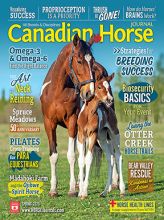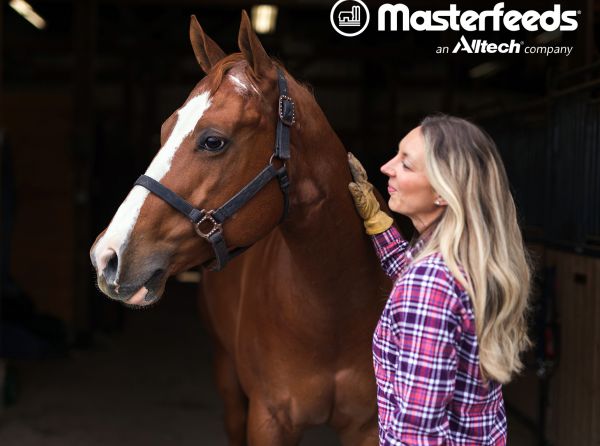By Margaret Evans
Ten-year-old Kyra Barrett was born legally blind with a genetic condition known as retinal dystrophy. Ever since she could sit up, she has been on horses, and today is a skilled rider who loves jumping and competing in eventing. But in August 2019, Equestrian Canada (EC) revoked Barrett’s use of compensating aids that were approved on EC’s own master list, essentially barring her from being able to compete.
To control sunlight glare, Barrett wears a visor attached to her helmet, similar to the visors many riders wear to deflect light when in the arena or on a cross-country course. In addition, when riding the cross-country phase, she has a guide rider close by who directs her to each solid fence coming up. The guide calls “left,”, “right,” or “straight,” at which point Barrett knows she is a few strides from the fence and just has to ride it.


In 2018, she began eventing and entered hors concours. It was an opportunity to show that riding with her aids were both fair and safe. The family lives in Prichard, BC and, this spring, her mother Hayley Jordan applied to EC to get Barrett certified for her Bronze sport license, which would allow her to compete.
“We met and I explained we needed living (large) letters for dressage, she needs her visor, her sunglasses, and, for jumping, we need a head set as, depending on the ring, we need to talk her around the course,” says Jordan. “Then I explained the use of the guide horse and rider on the cross-country course. They added suggestions themselves like more people on the course to block jumps just in case. They then said we’re good to go. They said all I need to do on her entry is check the para/master list and the organizers will look it up on the Equestrian Canada website and all her aids will be there. About a month later [I was told] Kyra wasn’t blind enough for para-dressage. I said no problem, we aren’t doing that right now. Otherwise we’re good to go. We entered two shows both at Maple Ridge. We didn’t have a problem; the show office knew about her needs and they were fantastic. She placed third and second at those shows.”
The EC Para-Dressage Classification Master List shows Barrett listed as not eligible to compete in Para-Dressage but may compete in Dressage able-bodied classes with the use of the compensating aids listed in the Master List, which include the large visor on her helmet, sunglasses, and large letters or “living letters.”
At the Campbell Valley Horse Trials in Langley, BC in mid-August, some questions were raised and resolved, and Barrett went on to ride using her compensating aids and her guide rider. She finished in second place. However, Jordan was once more in touch with EC to discuss the show.

“That’s when I was told we had our aids revoked,” she said. “I was told an email had been sent but I never received an email from them. They re-sent the email and it was dated July, well into the show season.”
At first, EC said the compensating aids were an unfair advantage then, Jordan says, they claimed it was a safety issue.
“I asked if any show had phoned in sighting safety concerns and was told they had received no complaints,” says Jordan. “Kyra has never fallen off at a show. She’s had a refusal here and there. But we’ve never had a safety concern. The man who guides Kyra is a one-star eventer from Ireland. He’s seen this lots in Ireland. He was confident and comfortable with what we were doing.”
There is clearly confusion about the position EC has placed itself in. While denying Barrett the use of compensating aids as approved in their Master List, the organization issued a press release on August 26 with respect to the compensating aids issue. It stated, “While health information and documentation related to EC classification is confidential, EC can confirm that, following protocol, the classification review for athlete, Kyra Barrett, was based on recommendations from the Canadian Blind Sports Association, and the approved compensating aids follow current FEI Para Equestrian Classification Rules and EC Rules.
“Classified athletes are not barred from competing in any EC sanctioned competitions. The rules simply stipulate that, when competing with compensating aids, athletes do so within the parameters of their assessment.”

If classified athletes are not barred from competing in any EC sanctioned competitions, why, Jordan asks, has her daughter’s use of all her aids been revoked?
“We’re fighting this,” she says. “I think it will have to go to a lawyer. EC will not budge. Even in their own rule book it says that, for all Bronze sport licensed riders, adaptive aids must be allowed. Kyra loves to jump. There is not one reason why she cannot do what she is doing. She’s doing Starter level. There’s no reason they should be blocking us. According to EC, we could enter a competition, but we are not allowed to use an aid. Yet the Master List stipulates she can use a large visor, sunglasses, and large letters.”
Photos courtesy of Hayley Jordan



























